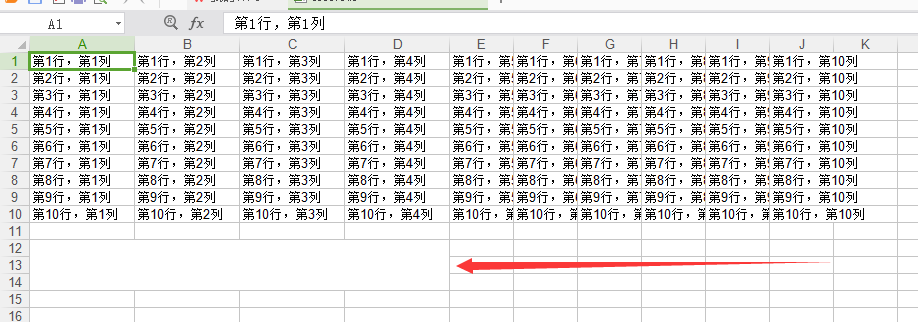1.通过FileStream新建xls文件
FileStream FS = new FileStream(@"H: est1.xls", FileMode.Create); //新建xls文件
2.添加引用
using NPOI.HSSF.UserModel; using NPOI.SS.UserModel; using System.IO;
3.创建一个Sheet
HSSFWorkbook HB = new HSSFWorkbook(); ISheet Sheet1 = HB.CreateSheet("One"); //创建一个Sheet

4.设置单元的宽度高度并插入数据
Sheet1.SetColumnWidth(0, 15 * 256); Sheet1.SetColumnWidth(1, 15 * 256); Sheet1.SetColumnWidth(2, 15 * 256); Sheet1.SetColumnWidth(3, 15 * 256);
for (int i = 0; i < 10; i++)
{
IRow row1 = Sheet1.CreateRow(i);
row1.Height = 20 * 20; //设置行高
for (int j = 0; j < 10; j++)
{
ICell cell1 = row1.CreateCell(j);
cell1.SetCellValue("第" + (i + 1) + "行,第" + (j + 1) + "列");
}
}
HB.Write(FS); //把流写入excel
起始四列设置了宽度,红线右边没有。自己对比看

5.合并单元格
//CellRangeAddress()该方法的参数次序是:开始行号,结束行号,开始列号,结束列号。 Sheet1.AddMergedRegion(new NPOI.SS.Util.CellRangeAddress(11, 13, 0, 3));
合并效果:

整体
using System; using System.Collections.Generic; using System.Linq; using System.Text; using System.Threading.Tasks; using NPOI.HSSF.UserModel; using NPOI.SS.Formula.Eval; using NPOI.SS.Formula.Functions; using NPOI.SS.UserModel; using NPOI.XSSF.UserModel; using NPOI.POIFS.FileSystem; using NPOI.HPSF; using System.IO; using NPOI.SS.Util; using System.Drawing; using NPOI.HSSF.Util; namespace NPOI { class Program3 { static void Main(string[] args) { //说明:设置单元格对齐方式 //1.创建EXCEL中的Workbook IWorkbook myworkbook = new XSSFWorkbook(); //2.创建Workbook中的Sheet ISheet mysheet = myworkbook.CreateSheet("sheet1"); mysheet.SetColumnWidth(0, 24 * 256); mysheet.SetColumnWidth(1, 24 * 256); mysheet.SetColumnWidth(2, 24 * 256); mysheet.SetColumnWidth(3, 24 * 256); //3.创建Row中的Cell并赋值 IRow row0 = mysheet.CreateRow(0); row0.Height = 50 * 20; row0.CreateCell(0).SetCellValue("对齐方式"); row0.CreateCell(1).SetCellValue("对齐方式"); row0.CreateCell(2).SetCellValue("对齐方式"); row0.CreateCell(3).SetCellValue("对齐方式"); IRow row1 = mysheet.CreateRow(1); row1.Height = 50 * 20; row1.CreateCell(0).SetCellValue("对齐方式"); row1.CreateCell(1).SetCellValue("Shanghai is the largest city by population in "); row1.CreateCell(2).SetCellValue("对齐方式"); row1.CreateCell(3).SetCellValue("对齐方式"); //4.创建CellStyle ICellStyle style0 = myworkbook.CreateCellStyle(); style0.Alignment = HorizontalAlignment.General;//【General】数字、时间默认:右对齐;BOOL:默认居中;字符串:默认左对齐 ICellStyle style1 = myworkbook.CreateCellStyle(); style1.Alignment = HorizontalAlignment.Left;//【Left】左对齐 ICellStyle style2 = myworkbook.CreateCellStyle(); style2.Alignment = HorizontalAlignment.Center;//【Center】居中 ICellStyle style3 = myworkbook.CreateCellStyle(); style3.Alignment = HorizontalAlignment.Right;//【Right】右对齐 ICellStyle style4 = myworkbook.CreateCellStyle(); style4.Alignment = HorizontalAlignment.Fill;//【Fill】填充 ICellStyle style5 = myworkbook.CreateCellStyle(); style5.Alignment = HorizontalAlignment.Justify;//【Justify】两端对齐[会自动换行](主要针对英文) ICellStyle style6 = myworkbook.CreateCellStyle(); style6.Alignment = HorizontalAlignment.CenterSelection;//【CenterSelection】跨列居中 ICellStyle style7 = myworkbook.CreateCellStyle(); style7.Alignment = HorizontalAlignment.Distributed;//【Distributed】分散对齐[会自动换行] //【Tips】 // 1.通过ICellStyle的VerticalAlignment属性可以设置垂直对齐模式与水平对齐无异 不再演示 // 2.通过ISheet的SetDefaultColumnStyle(int column, ICellStyle style)方法可以设置整列的默认单元格样式; //5.将CellStyle应用于具体单元格 row0.GetCell(0).CellStyle = style0; row0.GetCell(1).CellStyle = style1; row0.GetCell(2).CellStyle = style2; row0.GetCell(3).CellStyle = style3; row1.GetCell(0).CellStyle = style4; row1.GetCell(1).CellStyle = style5; row1.GetCell(2).CellStyle = style6; row1.GetCell(3).CellStyle = style7; //6.保存 FileStream file = new FileStream(@"E:myworkbook3.xlsx", FileMode.Create); myworkbook.Write(file); file.Close(); } } }